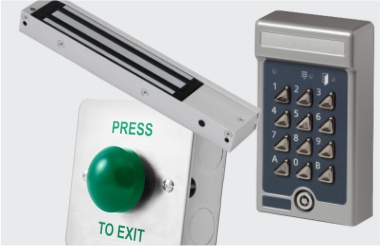What Are The Backup Options For Access Control Systems In Case Of Power Outages?
The important factor when assessing the security of a business, is that you have to maintain that security on a 24/7 basis. Threats and risks to a business can happen at any time, and you can’t afford to lapse your security measures in any circumstance. This extends to circumstances which could compromise the operation of your security controls, and this could include a power outage that renders your access control system inoperable.
Typically an access control system is essentially a digital system which needs a power source to operate properly. There are lots of advantages to an access control system when compared to more traditional forms of security, such as a mechanical lock and key for example, but one disadvantage is that a power outage can cause you considerable problems and is something you need to mitigate against.
How can a power outage occur?
The most challenging aspect of a power outage is that it can occur at any time, and there is usually no warning, other than in extreme weather conditions where you can see that an impending power outage is possible. So storms and extreme weather events are one way a power outage can occur, others are connected to the electrical system itself, which can fail, can become damaged or can be overloaded and therefore shutdown.
And because power outages are largely unpredictable, a business needs to implement some contingency planning to guard against this and minimise the consequences.
What a business can do to maintain security during a power outage
Most digital locks can be set-up to activate in a certain way when power is lost, but there are advantages and disadvantages to each, and in truth, neither are a legitimate back-up system for losing power and maintaining full safety and security.
So when power is lost, a digital lock can be set-up to activate in two different ways. The lock can be engaged and kept locked when power is lost. So this will protect the building from unauthorised entry, but does mean that emergency evacuation is not possible, ie. through the main entry/exit point. You could enter and exit through other means, such as fire exits, but this does compromise fire safety and therefore also insurance. The other way is to keep the door unlocked when power is lost, so the lock is disengaged in a power outage. This means that employees can come and go freely, but does leave the building insecure and open to unauthorised access.
The good news is that most access control systems will have a battery back-up for occasions where mains power is lost. So the battery will takeover in the event of a power outage and there will be continuity and no disruption to normal operations. However, in most cases this battery power will only last for around 24 hours, so further contingency plans need to be in place in case the power outage is more severe than that.
Other contingency plans are to install a generator. Again, this can provide power when mains electricity is lost, while Uninterruptible Power Supplies (UPS) – similar to batteries - are another option and are commonly used to maintain power to IT servers, which are another key element of a business’s infrastructure which needs to be covered by an emergency response procedure. As a final option to plan for the event of a power outage, a business can retain a physical key, which can be used to engage/disengage the access control system when power is lost, but is not able to be used otherwise. In this event, yes, the point of access can be opened and closed as normal, but the other functionality of the access control system – recording who enters/exits and when etc – won’t be available until power is restored or another back-up system is employed.
Planning for power outages at your business
Every competent and professional thinking business should have an emergency response plan in place for when power is lost. This could be a stipulation of an insurance policy in terms of ensuring a continuity of operations. From a safety point of view, a business needs to ensure ventilation and lighting is still adequate and that fire exits can be accessed, but otherwise, an emergency plan for a power outage should include:
- Clear roles and responsibilities of individuals
- Who to contact for updates and information
- Training for people using generators etc, which can be rarely used items but need specific actions and precautions to operate safely
- Who oversees the operation in terms of co-ordinating plans, making decisions and maintaining calm.
Contact MB Direct for more information on how your access control system works
If you have an access control system or are thinking of installing one, MB Direct can talk to you about how it works and what supporting plans and procedures you need in place. So check out our range of access control systems and contact MB Direct today.